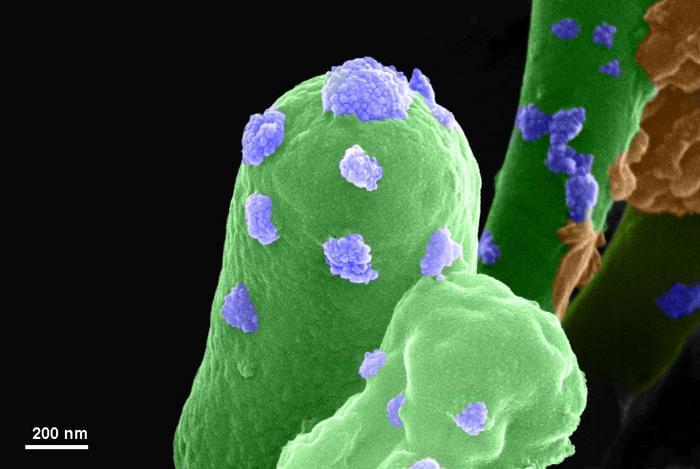Scientists have turned light into a remote control for building—and erasing—crystals on demand.
Category: habitats

Space Station Microbes Harvest Metals from Meteorites
Most microbes aboard the International Space Station can extract valuable metals like palladium from meteorite material in microgravity, showing potential for sustainable space resource mining.
How can microbes be used to help enhance human space exploration, specifically on the Moon and Mars? This is what a recent study published in npj Microgravity hopes to address as a team of scientists investigated how microbes could be used to harvest essential minerals from rocks that could be used to enhance sustainability efforts on long-term human missions to the Moon and Mars. This study has the potential to help scientists develop new methods for improving human spaceflight, which could substantially alleviate the need for relying on Earth for supplies.
For the study, the researchers sent meteorite and microorganism samples to the International Space Station (ISS) where astronauts conducted a series of experiments to ascertain how microorganisms could harvest essential minerals, specifically platinum and palladium, from the meteorite samples. Concurrently, the researchers also conducted the same experiments on Earth to compare the results under microgravity and terrestrial environments.
The goal of the study was to ascertain whether microorganisms could be used on future long-term space missions to harvest precious metals for construction of space habitats. In the end, the researchers and astronauts found that the microorganisms not only successfully extracted metals like palladium and platinum but also had minimal fungal residues typically that results from such processes. This lack of fungal residue was found to be more prevalent under microgravity conditions.

Colonists dredged away Sydney’s natural oyster reefs. Now, scientists know how best to restore them
New research has identified optimal design for artificial habitats to support restoration of oyster reefs, based on a detailed understanding of natural oyster reef geometry. Published in the global journal Nature, the Sydney-based study shows the complex shapes of natural oyster reefs are not random—their structure and arrangement optimize the establishment and survival of developing oysters and their protection from predators.
Oysters are really “ecosystem engineers,” building their own reefs made up of living oysters and the discarded shells of previous generations, explains lead author of the study, Dr. Juan Esquivel-Muelbert of Macquarie University.
“But reefs aren’t just piles of shells or skeletons,” says Dr. Esquivel-Muelbert. “Reefs are finely tuned 3D systems. Their shape controls who lives, who dies and how fast the reef grows.”

Homes in the fire zone: Why wildland-urban blazes create significantly more air pollution
A research team led by the U.S. National Science Foundation National Center for Atmospheric Research (NSF NCAR) has published a foundational inventory of emissions produced by structures destroyed by fires in the wildland-urban interface (WUI). Previously, researchers suspected that fires in WUI areas—spaces where human development and undeveloped wildland meet—produce emissions that are likely more harmful than those produced by forest or grass fires. However, the amount of emissions had not been quantified.
This new study, published in Nature Communications, provides the first inventory of emissions from structure fires in WUI areas. The results definitively reveal structure fires as a major source of air pollution.
WUI fires are becoming increasingly more common in the U.S. and have destroyed more than 100,000 homes since 2005. Because these events are intensely concentrated both in time and space, they can produce exceptionally high local pollution, which has important implications for the air quality and public health of nearby urban areas.

Intense sunlight reduces plant diversity and biomass across global grasslands, study finds
The sun is the basis for photosynthesis, but not all plants thrive in strong sunlight. Strong sunlight constrains plant diversity and plant biomass in the world’s grasslands, a new study shows. Temperature, precipitation, and atmospheric nitrogen deposition have less impact on plant diversity. These results were published in the Proceedings of the National Academy of Sciences by a research team led by Marie Spohn from the Swedish University of Agricultural Sciences.
The steppes of North America, the Serengeti savanna, the Svalbard tundra and natural pastures in the Alps are examples of habitats that are described as grasslands, with the common feature that there are no trees and the vegetation is dominated by grasses and other herbaceous plants. The diversity of plant species in these grasslands varies considerably, but the question of what controls plant diversity has challenged researchers for decades.
Last year, in a study on grasslands, Spohn from SLU and colleagues found that soil properties and climate factors, such as temperature, did not explain variations in plant diversity. “This finding surprised me,” says Spohn. “And that’s when I started wondering about the importance of sunlight for plant diversity in grasslands and decided to start a new project that would explore this relationship.”

Planetary microbiome structure and generalist-driven gene flow across disparate habitats
Now online! A planetary-scale analysis of over 85,000 metagenomes establishes a framework for exploring the structure and drivers of global microbial habitats, revealing that generalist species bridge ecological boundaries to mediate gene flow across disparate habitats, including the dissemination of antimicrobial resistance.
How Big Could a Space Habitat Get?
How big could space habitats really get? From O’Neill cylinders to Ringworlds and Topopolises, we explore the true limits of megastructure scale.
Get Nebula using my link for 50% off an annual subscription: https://go.nebula.tv/isaacarthur.
Watch my exclusive video Chronoengineering: https://nebula.tv/videos/isaacarthur–… Join this channel to get access to perks: / @isaacarthursfia 🛒 SFIA Merchandise: https://isaac-arthur-shop.fourthwall… 🌐 Visit our Website: http://www.isaacarthur.net ❤️ Support us on Patreon:
/ isaacarthur ⭐ Support us on Subscribestar: https://www.subscribestar.com/isaac-a… 👥 Facebook Group:
/ 1,583,992,725,237,264 📣 Reddit Community:
/ isaacarthur 🐦 Follow on Twitter / X:
/ isaac_a_arthur 💬 SFIA Discord Server:
/ discord Credits: How Big Could a Space Habitat Get? Written, Produced & Narrated by: Isaac Arthur Editor: Tim Liusko Graphics from Fishy Tree, Jarred Eagley, Jeremy Jozwik, J. Dixon, Ken York, Udo Schroeter Music Courtesy of Chris Zabriskie & Stellardrone Select imagery/video supplied by Getty Images Music by Epidemic Sound: http://nebula.tv/epidemic & Stellardrone Chapters 0:00 Intro 2:03 Basics of Habitat Scaling 9:30 Cylinder & Ring Habitats — Linear and Radial Extremes 11:00 Banks Orbitals 12:42 Ringworlds 16:24 Chrono-Engineering 17:24 The Topopolis 21:03 Planet-Wrapping Habitats 22:55 Matrioshka Shellworlds 26:17Alternative & Exotic Designs.
🚀 Join this channel to get access to perks: / @isaacarthursfia.
🛒 SFIA Merchandise: https://isaac-arthur-shop.fourthwall…
🌐 Visit our Website: http://www.isaacarthur.net.
❤️ Support us on Patreon: / isaacarthur.
⭐ Support us on Subscribestar: https://www.subscribestar.com/isaac-a…
👥 Facebook Group: / 1583992725237264
📣 Reddit Community: / isaacarthur.
🐦 Follow on Twitter / X: / isaac_a_arthur.
💬 SFIA Discord Server: / discord.
Credits:
Project Genie | Experimenting with infinite interactive worlds
The holodeck is here with Project Genie.
Deep Space Habitats — Designing Self Sustaining Biomes for Interstellar Journeys
How and why would humans live far from stars? Exploring deep-space habitats, artificial suns, and megastructures.
Join FlexiSpot’s Valentine’s Specials with up to 65% off! Shop now and use my code \.

Bacteria Form Stronger Mars Bricks Despite Toxic Soil
“When the effect of perchlorate on just the bacteria is studied in isolation, it is a stressful factor,” said Swati Dubey. “But in the bricks, with the right ingredients in the mixture, perchlorate is helping.”
How can engineers design bricks on Mars for future habitats despite the toxic Martian regolith, also called perchlorates? This is what a recent study published in PLOS One hopes to address as an international team of scientists investigated how bacteria can be used to construct strong bricks on Mars despite the presence of perchlorates. This study has the potential to help scientists, engineers, and future Mars astronauts develop novel methods for designing future Mars habitats.
For the study, the researchers tested perchlorates on Martians bricks built with regolith simulant and bacteria, also called biocementation, to ascertain how the perchlorates affected the integrity of the bricks, and specifically how the bacteria responded to the perchlorates. The goal of the study was to ascertain how perchlorates could influence Martian brick construction methods using bacteria, the latter of which has been explored in past studies using the soil bacterium Sporosarcina pasteurii. In the end, the researchers found that despite the perchlorates slowing the growth of the bacteria within the bricks, the process resulted in stronger bricks.